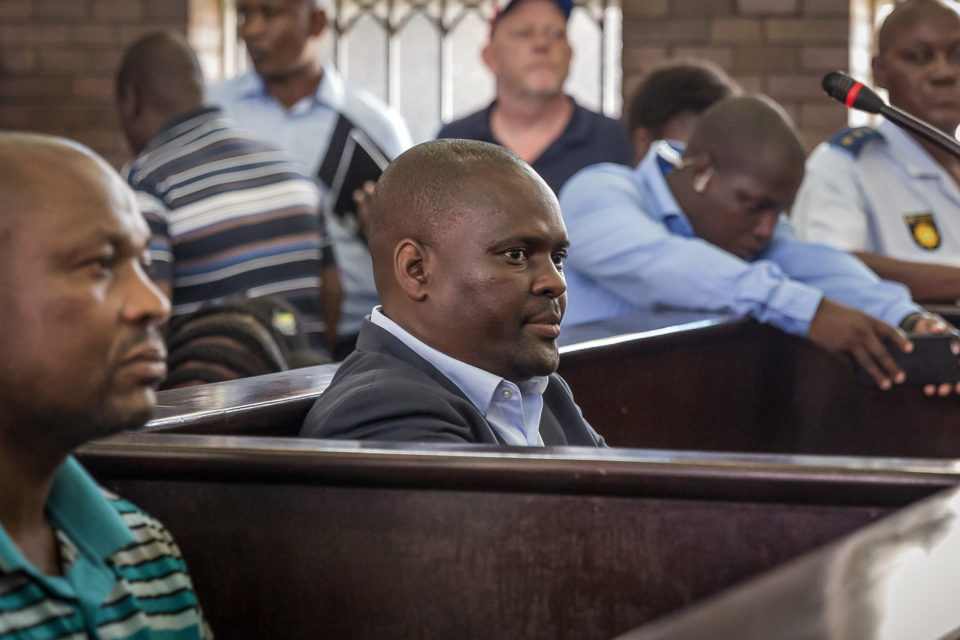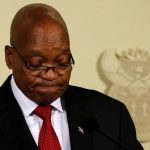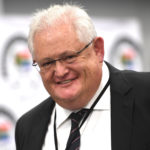Political assassination the currency of corruption
Part one of a series on political killings in South Africa delves into the breakdown of integrity at party branch level in KwaZulu-Natal, and the subsequent rise in corruption and murder.
Author:
25 March 2019

The “placards” protesters carried outside the uMzimkhulu magistrates’ court on Tuesday 19 March were single A4 sheets of white paper, the messages of support on them for Harry Gwala District Mayor Mluleki Ndobe scribbled with felt-tip pens so lacking in ink that they barely registered.
Yet they were instructive; for their haphazardness, their impoverished quality and the messages they carried. Some suggested Ndobe was a kind of messiah for a region woefully underdeveloped, despite special provincial budget allocations to address this, or his own purported work, it appeared.
Others called out Mxolisi Kaunda, the KwaZulu-Natal member of the executive council for transport, community safety and liaison, for allegedly being behind the arrest on the morning of Sunday 17 March and subsequent charging of Ndobe for the 2017 murder of another ANC leader, uMzimkhulu PR councillor Sindiso Magaqa.
While the 50-odd Magaqa supporters outside the magistrate’s court on Tuesday wore ANC T-shirts while singing, dancing and facing off with the pro-Ndobe crowd, the latter did not. Yet their minders, a handful of leaders and choir orchestrators, including KwaDukuza mayor Ricardo Mthembu, did.
One of the choirmasters approached New Frame and suggested that it cover the “real story of what is happening here”. Ndobe is being pursued because of “political jealousy” by people like Kaunda, she said. Ndobe appeared at number three on the party’s province to province election list, ensuring him a plum job in the KwaZulu-Natal Cabinet after the May polls.
Ndobe has really helped this part of the southern Midlands, she added vociferously, providing no proof to counter the broken streets, inability to create meaningful jobs in the area and allegations of corruption that have swirled around the local and district municipalities for more than a decade.
She was adamant that Ndobe is a victim of his own success and a political conspiracy, yet not convinced enough to go on the record with her name or position in the ANC or government.

End of days
The scenes outside the uMzimkhulu magistrates’ court appeared to signal the beginning of the end days of the late-era Jacob Zuma project in the province.
Ndobe, Kaunda and others, such as provincial education minister Mthandeni Dlungwane and former ANC provincial secretary Super Zuma, emerged as serious power brokers – and allies – in Zuma’s reinstallation as ANC president at the party’s national elective conference in Mangaung in 2012. Yet, in 2019, they appear divided.
In ousting Thabo Mbeki as president of the ANC in Polokwane in 2007, Zuma harnessed the branch-mobilising capacity of the ANC’s regional leadership around the country. In doing so, the refinement process within sections of the ANC – of conflating state and party, and of ensuring the maintenance of local voting banks through the distribution of largesse leeched off the state and municipal tenders intended to deliver services and uplift communities – gathered momentum.
Related article:
Branches, as ANC members have asserted in various high courts and a commission of inquiry, became spaces of violent contestation. Armed guards controlled who was allowed to enter meetings and policed what was allowed to be said. Other allegations include branch numbers being inflated with ghost members and legitimate members not being informed of last-minute venue changes for meetings. Parallel branches were set up in some instances. The ANC’s internal democracy was being suppressed.
Careerism and corruption became increasingly institutionalised. In impoverished communities like uMzimkhulu corruption eats away at economic growth and ensures projects never generate enough jobs, hope, dignity or, sometimes, even their basic intentions – such as the incomplete uMzimkhulu Memorial Hall, which Magaqa raised questions about before his death, when costs ballooned from R4 million to R37 million. In uMzimkhulu and similar areas, becoming a branch leader and then a councillor appears to be one of the few ways out of penury.
Increase in killings
The ANC leadership in the provinces appeared to do little to remedy the corrupted and bloody situation.
Former ANC councillor and speaker in the Harry Gwala Municipality from 2011, Mandla Ngcobo, told the Moerane Commission of Inquiry into political killings in KwaZulu-Natal of his attempts to raise incidents of corruption with the provincial leadership on several occasions, most recently in 2014.
Aside from being censured and becoming an “outcast” for bringing the ANC into disrepute after his letter flagging “financial irregularities and the conduct of comrades” was leaked to the media, nothing was done. There are many such stories from ANC comrades in towns and cities across KwaZulu-Natal.
Desperation either to ascend to or hold on to power has consequently intensified in KwaZulu-Natal, and so have political killings within the ANC.
Several ANC members who were witnesses to the Moerane Commission of Inquiry talked of an increase in killings before local government elections as people vied for positions on election lists – and then again when there was fighting over tenders, kickbacks or an attempt to stop such malfeasance. Factionalism became an unavoidable necessity of such attempts to consolidate or assume power.
Regional power bases
The numbers are approximate, but more than 100 politicians, mainly ANC members, have been killed in the past decade.
It’s a phenomenon that runs back through the beginning of democracy, the early 1990s and all of the 1980s, when the United Democratic Front and ANC were fighting an internecine war with the Inkatha Freedom Party, which the apartheid regime supported.
The template of consolidating regional power bases to maintain power within the ANC at Polokwane ensured the meteoric rise of Ndobe, Kaunda and others. In the Moses Mabhida region, which includes Pietermaritzburg, it also centred around Jacob Zuma’s family and clan members, like Super Zuma, climbing the leadership structures.
The Harry Gwala regional chairperson of the ANC in 2012, Ndobe was elected as KwaZulu-Natal deputy secretary at the ANC’s 2015 elective conference. Super Zuma was elected provincial secretary. Sihle Zikalala, then incumbent provincial secretary – a vital position with oversight of ANC procedures, including membership verification and election list processes – became chairperson. All were Jacob Zuma loyalists working to ensure that Nkosazana Dlamini Zuma succeeded her ex-husband as ANC national president.
The 2015 conference would later be declared unlawful and invalid, prompting the dissolution of the provincial leadership structures it ushered in. But by the time of the high court’s 2017 ruling Premier Senzo Mchunu (a supporter of Cyril Ramaphosa), whose faction had been defeated at the provincial conference, had already been recalled together with some of his supporters.
Political oversight
Younger blood was installed in key positions. Zikalala became the MEC for economic development, tourism and environmental affairs. Kaunda’s portfolio, effectively that of police minister in the province, meant he had political oversight of the policing and investigations of political killings in the province.
The killings escalated. In 2017, six ANC politicians were killed in the Harry Gwala region alone: Nkosinathi Ngcobo, an ANC official from Bulwer; Khaya Thobela, the uMzimkhulu municipality speaker and ANC Harry Gwala deputy regional secretary at the time; uMzimkhulu councillors Khaya Mgcwaba and Mduduzi Tshibase; ANC Subregional Treasurer Dumisani Dlamini; and Magaqa.
The families and comrades of the deceased told the Moerane Commission that they were unhappy with the lack of progress in these investigations, especially as in some instances documented evidence relating to corruption at a municipal level had been handed over to the police. This, they asserted, would have helped solidify the cases against the masterminds giving orders to the foot soldiers who pulled the triggers.
Some have testified that there has been an improvement in investigations and feedback from the police since a national interministerial task team has taken oversight of the process.

Police investigations
The fractures starting to appear between politicians like Kaunda and Ndobe, and the invisibility of people like Super Zuma in uMzimkhulu, appears to confirm the disintegration of the provincial coalition that ensured Jacob Zuma continued as ANC president in 2012. And pushed hard for Dlamini Zuma to succeed him in 2017.
It also suggests that the coalition had no ideological substance around which to cohere. And that the Zuma project, despite its pro-poor, pro-Black claims, has apparently been merely about the control and pillaging of state resources through the reinforcement of antidemocratic violence within the ANC and the country.
The timing of the charges against Ndobe appears ideal to set off electoral discontent at the ANC’s election lists, which include many people accused of being handmaidens to Zuma’s state capture project.
Related article:
It may also be the beginning of a concerted effort to give momentum to Cyril Ramaphosa’s strategy to allow the police, the National Prosecuting Authority (NPA) and the judiciary to clean up the ANC where his faction cannot, because of the prevalence of Zuma acolytes on the party’s national executive committee and in various provincial structures.
Last week, ANC provincial spokesperson Gugu Simelane-Zulu said that the party’s KZN leadership would soon make a decision on what procedures they would use in instances like Ndobe’s — where ANC leaders who featured prominently on the party’s election list were charged for crimes such as murder.
In court on Tuesday 19 March, prosecutor Sohana Moodley made clear that police investigations were ongoing and that more people were expected to be arrested and charged with Magaqa’s murder. Of the three ANC members who were barred by the Magaqa family from attending Sindiso’s funeral, two, Ndobe and Harry Gwala Municipal Manager Zweliphansi Sikhosana, were in the dock. The third was uMzimkhulu Mayor Mphuthumi Mpabanga.
Authorities close in
The police and the Hawks are certainly circling ever closer to ANC politicians across KwaZulu-Natal.
In eThekwini, for example, Mayor Zandile Gumede’s “personal adviser”, Mlungisi Ntombela, had to take out a court order to stop the Hawks from allegedly “harassing” him. The Hawks have maintained they are investigating the link between Gumede, Ntombela and eThekwini councillor Mthokozisi Nojiyeza, who was arrested for the murder of another councillor, Sibusiso Maphumulo, in October 2017.
Gumede’s spokesperson, Mthunzi Gumede, was also recently taken in for questioning and has had his cellular phone confiscated. According to media reports he has since “disappeared” from work.
Durban is aswirl with rumours of more arrests, as are other towns and cities in the province that has been drenched in blood for too long.
On Friday, 22 March, the Mail & Guardian reported that Newcastle mayor Ntuthuko Mahlaba, who is being investigated for the murder of former eMalahleni youth league leader Wandile Ngubeni in 2016, had been arrested. More arrests are sure to follow.
Ndobe and his co-accused – Sikhosana, businessperson Mbulelo Mpofana and former South African Police Service tactical response team member Sibonelo Myeza – have been charged with the premeditated murder of Magaqa and the attempted murder of two other uMzimkhulu ANC councillors, Nontsikelelo Mafa and Jabulile Msiya. Both were injured while sitting inside Magaqa’s vehicle when the shooting occurred in July 2017.
Magaqa had been national secretary general of the ANC Youth League in 2011, when he was suspended from the ANC together with former ANC Youth League President Julius Malema. After serving his suspension he had returned to uMzimkhulu to work at branch level. The accused were not asked to plead and will reappear in the magistrates’ court on 25 and 26 March for their bail application hearing.
Update: Charges against Mayor Mluleki Ndobe were provisionally withdrawn on 25 March.
Correction: A previous version of this article erroneously stated that Zikalala became a member of the executive council for finance.
This is part of a series, Killing Fields, which investigates political killings in South Africa.


